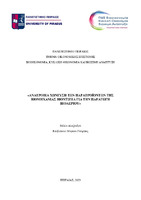Αναερόβια χώνευση των παραπροϊόντων της βιομηχανίας βιοντίζελ για την παραγωγή βιοαερίου
Anaerobic digestion of the by-products of the biodiesel industry for biogas production

Προβολή/
Λέξεις κλειδιά
Βιομάζα ; Βιοντίζελ ; Βιοαέριο ; Γλυκερόλη ; Αναερόβια χώνευση ; Μονάδα βιοαερίου ; Ρυθμός οργανικής φόρτισης ; Δυναμικό βιοαερίου ; Ηλεκτρική ενέργεια ; Καθαρή παρούσα αξία ; Ανάλυση ευαισθησίαςΠερίληψη
Στόχος της κυκλικής οικονομίας είναι να παράγει προϊόντα σε ένα «σύστημα κλειστού βρόχου» ελαχιστοποιώντας έτσι την παραγωγή αποβλήτων, όπου έρχεται σε αντίθεση με το πιο διαδεδομένο μη βιώσιμο γραμμικό μοντέλο «προμήθεια, παραγωγή και απόρριψη». Η γλυκερόλη αποτελεί ένα σημαντικό παραπροϊόν της βιομηχανίας βιοντίζελ καθώς αντιστοιχεί στο 10% της παραγόμενης ποσότητάς του. Το γεγονός αυτό οδήγησε στη μεγάλη αύξηση παραγωγής της γλυκερόλης σε παγκόσμιο επίπεδο. Επειδή, η περίσσεια της γλυκερόλης δε μπορεί να ενσωματωθεί από τους βιομηχανικούς κλάδους που τη χρησιμοποιούν, μέσω βιοχημικών διεργασιών όπως είναι η αναερόβια χώνευση, μπορεί να μετατραπεί σε βιοαέριο.
Στην παρακάτω μελέτη πραγματοποιείται μια οικονομοτεχνική ανάλυση μίας μονάδας βιοαερίου η οποία παράγει γλυκερόλη μέσω της αναερόβιας χώνευσης. Αρχικά, μελετήθηκε η επίδραση του ρυθμού οργανικής φόρτισης της γλυκερόλης στο δυναμικό του βιοαερίου και στη συνέχεια, η επίδραση αυτών των δύο ξεχωριστά για τις παραμέτρους που αφορούν τον όγκο του βιοαντιδραστήρα, το κόστος της επένδυσης, την ενέργεια που παράγεται και την καθαρή παρούσα αξία. Έπειτα, πραγματοποιήθηκε μία ανάλυση ευαισθησίας στην οποία παρατηρήθηκε η επίδραση της οργανικής φόρτισης και του δυναμικού του βιοαερίου στην καθαρή παρούσα αξία σε διάρκεια εικοσαετίας. Από τα αποτελέσματα της έρευνας, προκύπτει ότι όσο μεγαλύτερος είναι ο ρυθμός οργανικής φόρτισης και το δυναμικό του βιοαερίου, τόσο μεγαλύτερη είναι και η τιμή της καθαρής παρούσας αξίας, αναδεικνύοντας τη συγκεκριμένη πρακτική ως οικονομικά βιώσιμη.


